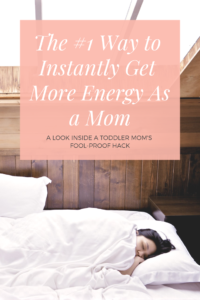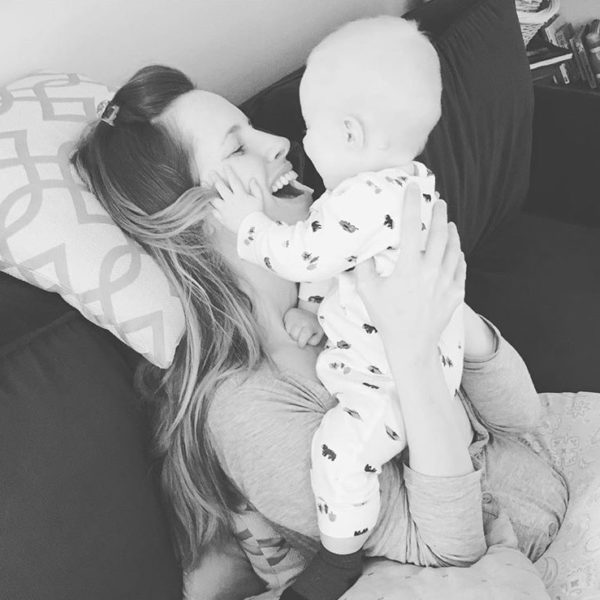“Motherhood” and “tired” seem to go together like coffee and creamer.
Maybe that’s because I’m constantly seeing t-shirts and memes about how tired we are and how much caffeine we need.
Maybe it’s because it’s just plain exhausting.

I never understood it before. I thought, “Well, if you get the same amount of sleep, why would you be any more tired?”
Naive, that’s the word for what I was.
Sure, parenthood will be tiring for 18+ years. The constant teaching, soothing & worrying takes it out of you, and I can imagine this never really ends.
Yet, I can’t go on feeling so tired for the next … forever, so I’m doing something about it.
You know the #1 way I have been able to find instant energy the past few weeks?
It’s the most simple thing and you’re not going to believe it.
Ready for it?
I’ve stopped telling myself I’m tired.
True story.
Don’t give up on me here. Let me explain.
I’m a fan of the Life Coach School podcast by Brooke Castillo, and one of the episodes I listened to recently was about how our actions and feelings are driven by our thoughts. She has a lot to say about this, and I highly recommend her podcast episode to learn more.
I’ll summarize here:
The chain of actions she teaches on goes like this:
Action <– Feelings <– Thoughts
Or to look at it in reverse:
Our thoughts –> create our feelings –> which drive our actions.
I was greatly intrigued by this use and have since used this template in many of my one-on-one sessions with clients to help them learn why they’re acting in ways that they don’t want to. I have found it to be extremely helpful and surprisingly accurate.
An inside look at emotional eating:
For example, if I have a client who’s tired of stress eating sweets, we’ll investigate her thoughts and feelings. Working backwards, her feeling is stress. So when she feels stressed, she turns to sweets. Now, this often happens without much thought, so it takes some digging and a lot of mindfulness to really analyze the thoughts she’s having. Often in this scenario, as can be the case in many others, the action has become a habit. That means it happens on auto-pilot and we don’t even realize we’re doing it.

When we start identifying the thoughts, they may sound something like:
“I had such a stressful day and I really just want something sweet to take my mind off of it.”
or
“Chocolate always makes me feel so much better. Let me just grab a piece to ease my stress. It always works.”
Now, emotional eating is quite complicated and can’t be boiled down to the terms I’m using here. But why this is so helpful is it helps the person become aware of their thoughts so they stop living on auto-pilot. If they want sweets, it’s because they decided to eat sweets, not because their body went through the motions without any thought.
In conversations like this, I help people try to find new thoughts that will create new feelings to drive new actions.
Let’s use the same example:
“I feel stressed because (I’m thinking) of the day I had at work. That makes me want to go eat something sweet.”
can become
“I feel stressed because I’m thinking about the day I had at work. I know when I feel stressed, I tend to eat chocolate. Instead of thinking about my lousy day at work, I’m going to remember something funny that happened today or something I’m grateful for.”
The awareness of the old thought makes it able to be changed. Now, when you’re thinking about something funny or you feel thankful, you’re less likely to eat chocolate out of stress, because you aren’t feeling as stressed anymore.

So, this is an exercise I use frequently in my practice. Here’s how I’ve used it on myself:
I noticed one day when my son and I got out of the car and into the house, I was saying “I’m just so tired.” I’m sure we had a toddler moment that took it out of me, I was hungry, and I was feeling that mid-day slump. But that feeling of tired made me think for a moment. Why exactly did I feel so tired?
You know why? Because I was thinking about it!
I was thinking about all we had done already that day, how much energy it takes to keep up with him, and how many hours were left before my head hit the bed. I’m sure I was also being a little dramatic about how “all moms are tired” or “I haven’t slept in over 2 years.” Neither of these statements is true, of course, but we use them to try to make us feel better. Except that they don’t.
You’re not always going to stress eat and I truly have had sleep in the past 2 years.
So, in that moment, I tested Brooke’s theory. I noticed my feeling of fatigue and the thoughts I was having in that moment that were only trying to confirm it, and I immediately changed my thoughts. “I’m tired because I’m hungry and it’s his nap time. I’m thankful we had a fun morning and now I’ll focus on making our lunch.”
Don’t let me lie to you. It’s not like a magical wand immediately infused my body with a cup of caffeine. But, I honestly didn’t feel so tired once I wasn’t thinking about it and trying to convince myself that I was. That sounds pretty ridiculous typing it out, but it’s exactly what was happening without much conscious thought.
I’ve tried this technique many times since I’ve learned about it and it really helps. Sure, I still can be exhausted from long days with an energetic toddler or fighting battles over getting dressed and brushing teeth. But instead of dwelling on it, thinking about it more and letting it make me grouchy, I’ve learned to quickly make the decision to get to bed at a decent hour and move on. Tired? Ok, do something about it – just stop thinking about it.
Want more?
I share some of the practical things you can do to increase your energy in a free guide I give my Facebook groupies. You can get them here.
All of these tips help, as well as the right mindset. I don’t believe nutrition or health are limited to just the physical, there should also be a balance with mental health. And in this instance, this trick can be used and your mindset will be changed pretty much immediately.
I encourage you to try this strategy the next time you think, “Oh my gosh, I’m a Mom and I’m so tired.” Ask yourself,
“What am I thinking about that’s making me feel so tired?”
You’re likely thinking about your fatigue. If you’re like me and want to stop being aware of how tired you are, then let’s be aware of something else.
Motherhood has too much joy and lasts far too long (ahem, eternity) for us to always feel this way.
I’d love to know what you think, and don’t forget to grab my free energy guide here.
Passionately,
Alyssa
P.S. If the emotional eating example I described resonates with you, consider working with me to straighten it out and set you free from food forever.






